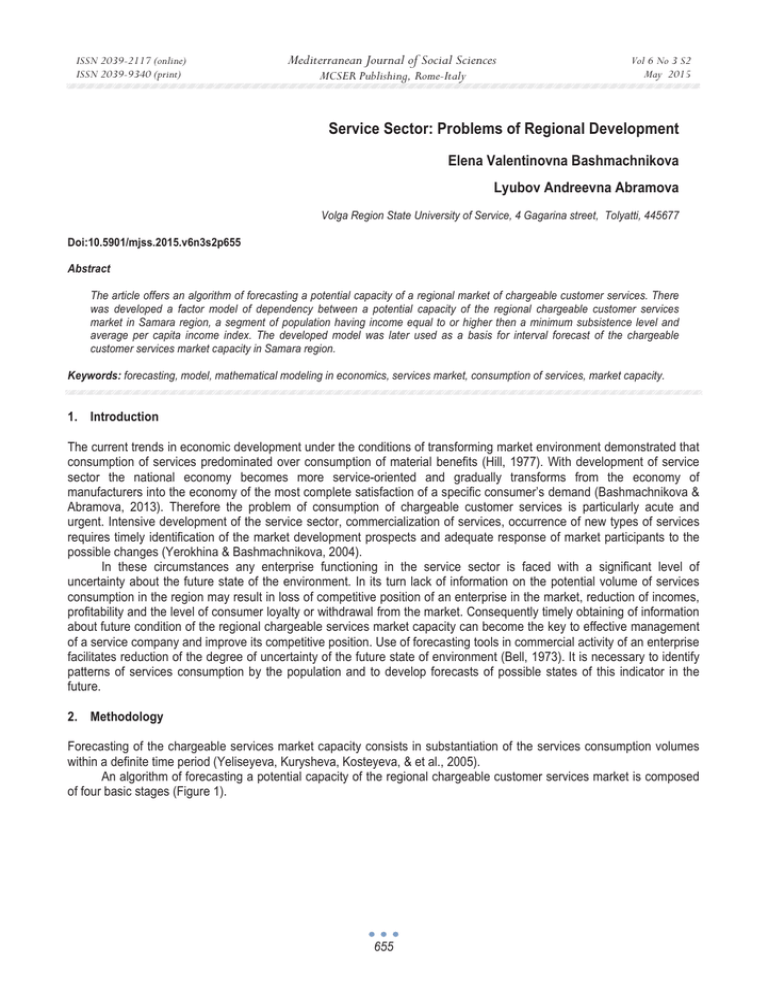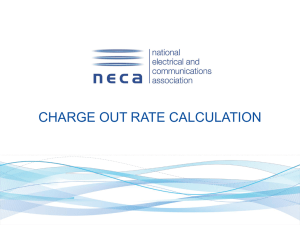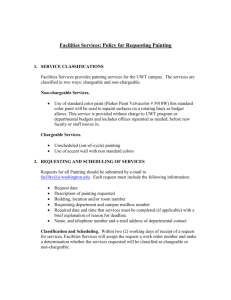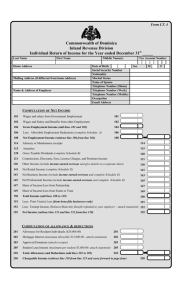Service Sector: Problems of Regional Development Mediterranean Journal of Social Sciences
advertisement

ISSN 2039-2117 (online) ISSN 2039-9340 (print) Mediterranean Journal of Social Sciences MCSER Publishing, Rome-Italy Vol 6 No 3 S2 May 2015 Service Sector: Problems of Regional Development Elena Valentinovna Bashmachnikova Lyubov Andreevna Abramova Volga Region State University of Service, 4 Gagarina street, Tolyatti, 445677 Doi:10.5901/mjss.2015.v6n3s2p655 Abstract The article offers an algorithm of forecasting a potential capacity of a regional market of chargeable customer services. There was developed a factor model of dependency between a potential capacity of the regional chargeable customer services market in Samara region, a segment of population having income equal to or higher then a minimum subsistence level and average per capita income index. The developed model was later used as a basis for interval forecast of the chargeable customer services market capacity in Samara region. Keywords: forecasting, model, mathematical modeling in economics, services market, consumption of services, market capacity. 1. Introduction The current trends in economic development under the conditions of transforming market environment demonstrated that consumption of services predominated over consumption of material benefits (Hill, 1977). With development of service sector the national economy becomes more service-oriented and gradually transforms from the economy of manufacturers into the economy of the most complete satisfaction of a specific consumer’s demand (Bashmachnikova & Abramova, 2013). Therefore the problem of consumption of chargeable customer services is particularly acute and urgent. Intensive development of the service sector, commercialization of services, occurrence of new types of services requires timely identification of the market development prospects and adequate response of market participants to the possible changes (Yerokhina & Bashmachnikova, 2004). In these circumstances any enterprise functioning in the service sector is faced with a significant level of uncertainty about the future state of the environment. In its turn lack of information on the potential volume of services consumption in the region may result in loss of competitive position of an enterprise in the market, reduction of incomes, profitability and the level of consumer loyalty or withdrawal from the market. Consequently timely obtaining of information about future condition of the regional chargeable services market capacity can become the key to effective management of a service company and improve its competitive position. Use of forecasting tools in commercial activity of an enterprise facilitates reduction of the degree of uncertainty of the future state of environment (Bell, 1973). It is necessary to identify patterns of services consumption by the population and to develop forecasts of possible states of this indicator in the future. 2. Methodology Forecasting of the chargeable services market capacity consists in substantiation of the services consumption volumes within a definite time period (Yeliseyeva, Kurysheva, Kosteyeva, & et al., 2005). An algorithm of forecasting a potential capacity of the regional chargeable customer services market is composed of four basic stages (Figure 1). 655 ISSN 2039-2117 (online) ISSN 2039-9340 (print) Mediterranean Journal of Social Sciences MCSER Publishing, Rome-Italy Vol 6 No 3 S2 May 2015 Figure 1. The algorithm of forecasting a potential capacity of the regional chargeable customer services market Application of the developed forecasting algorithm for prediction of a potential capacity of the regional chargeable customer services market is being realized using Samara region as an example. 3. Main Part Analysis of data contained in the materials of the Samara region territorial agency of the Federal State Statistics Service allowed to distinguish a growth trend in the volume of implemented services in Samara region for the last five years (the rate of growth of this index in 2012 made 49.18% by analogy with 2008. This confirms a positive trend in socio-economic development of Samara region, since the scope and the level of development of the chargeable services sector to a large extent determines an economic status of the region and the quality of life of its population. The following factors can influence on a potential capacity of the chargeable customer services market: 1) a consumer price index in regard to the services; 2) a per capita income growth index; 3) a region population size; 4) a minimum subsistence level; 4) a share of population having income equal to or higher then the minimum subsistence level; 5) a quality of life of the region population; 6) a degree of the market saturation etc. The results of the factor analysis made it possible to exclude irrelevant factors and to identify the most significant ones. The factors under consideration are the price index for the chargeable consumer services, the share of population in Samara region having income equal to or higher then the minimum subsistence level, and the per capita income growth index. It’s worth noting that the demand for the chargeable services in the region is predominantly satisfied and grows uniformly; the growth trend is maintained due to adequate and timely replenishment of the range of services. Therefore the forecasting model for a potential capacity of the chargeable customer services market in Samara region will have the form of a straight line represented by the following equation: ȿt = a 0 + a1 xut + a 2 xrt + a3 d t + a 4 vt , (1) where t - 1,2,… where ȿ t - a potential capacity of the chargeable services market of Samara region, mln. rubles. u t - a price index for the chargeable customer services in Samara region, % rt - a share of population in Samara region having income equal to or higher then the minimum subsistence level, % dt vt - a per capita income growth index in Samara region, % - other unaccounted factors effecting the chargeable services market development in Samara region at time point t. a - the model parameters. The data for construction of the model of a potential capacity of the chargeable services market in Samara region are given in Table 1. 656 Mediterranean Journal of Social Sciences ISSN 2039-2117 (online) ISSN 2039-9340 (print) Vol 6 No 3 S2 May 2015 MCSER Publishing, Rome-Italy Table 1. Data for construction of the model of the Samara region chargeable services market capacity Year Price index for the chargeable customer services in Samara u region, %, t Actual capacity of the chargeable services market, mln. rub. ( ȿ t ) Share of population in Samara region with income equal to or higher then the minimum r Per capita income growth index in Samara region, %, dt subsistence level, %, t 2008 81728.1 116.30 84.50 123.28 2009 95585.1 115.00 83.30 121.28 2010 106470.3 111.90 84.30 113.04 2011 112061.3 107.70 84.90 115.84 2012 121925.7 108.70 84.70 110.77 REMARK: (statistical data – Samarastat and Rosstat) (Official web-site of the Federal State Statistics Service; Regions of Russia. Socioeconomic indices) Presentation of an equation of the economic and mathematical model of a potential capacity of the chargeable customer services market in Samara region uses a least-squares method. In order to find the necessary parameters we need to build a set of equations which will appear as follows (Kaldor, 1957): ½ ­¦ E = na + a ¦ u + a ¦ xr + a ¦ d + a ¦ v ° ° °¦ E u = a ¦ u + a ¦ u + a ¦ u r + a ¦ u d + a ¦ u v ° ° ° ¾ ®¦ E r = a ¦ r + a ¦ u r + a ¦ r + a ¦ r d + a ¦ r v ° ° °¦ E d = a ¦ d + a ¦ u d + a ¦ r d + a ¦ d + a ¦ d v ° ° Ev =a ¦ v + a ¦ u v + a ¦ r v + a ¦ d v + a ¦ v °¿ ¯¦ (2) Data for building and solving of the set of equations is given in Table 2. t t 0 t 1 0 t t 2 1 t 3 t 2 t 2 t t t t 2 t 4 t t 3 t t t 4 2 t t 0 t 0 t t 0 t t 1 t t 1 1 t t t 2 t 2 3 t t 3 t t t 3 t 4 t t 2 t 4 t t t t 4 2 t Table 2. Background data for building and solving of the set of equations ȿt ut rt dt vt 116.3 115 111.9 107.7 108.7 559.6 84.5 83.3 84.3 84.9 84.7 421.7 u t rt 123.28 121.28 113.04 115.84 110.77 584.21 ut d t 1 2 3 4 5 15 Index 81728.1 95585.1 106470.3 112061.3 121925.7 517770.5 Et u t u t vt 2008 2009 2010 2011 2012 AMOUNT 9504978.03 10992286.5 11914026.57 12069002.01 13253323.59 57733616.7 13525.69 13225 12521.61 11599.29 11815.69 62687.28 14337.46 13947.2 12649.18 12475.97 12040.7 65450.51 116.3 230 335.7 430.8 543.5 1656.3 Index Et rt rt 2 9827.35 9579.5 9433.17 9143.73 9206.89 47190.64 rt d t rt vt Et d t 2008 2009 2010 2011 2012 AMOUNT 6906024.45 7962238.83 8975446.29 9514004.37 10327106.8 43684820.7 7140.25 6938.89 7106.49 7208.01 7174.09 35567.73 10417.16 10102.62 9529.272 9834.816 9382.219 49266.09 84.5 166.6 252.9 339.6 423.5 1267.1 10075440.17 11592560.93 12035402.71 12981180.99 13505709.79 60190294.59 Index d t2 d t vt Et v t vt2 2008 2009 2010 2011 2012 AMOUNT 15197.9584 14708.8384 12778.0416 13418.9056 12269.9929 68373.7369 123.28 242.56 339.12 463.36 553.85 1722.17 81728.1 191170.2 319410.9 448245.2 609628.5 1650182.9 1 4 9 16 25 55 Index 2008 2009 2010 2011 2012 AMOUNT u t2 Through substitution of indices in the set of equations by the values from Table 2 we’ll be able to get the following 657 Mediterranean Journal of Social Sciences ISSN 2039-2117 (online) ISSN 2039-9340 (print) Vol 6 No 3 S2 May 2015 MCSER Publishing, Rome-Italy interpretation: ­517770.5 = 5a 0 + 559.6a1 + 421.7 a 2 + 584.21a 3 + 15a 4 ½ °57733616.7 = 559.6a + 62687.28a + 47190.64a + 65450.51a + 1656.3a ° 0 1 2 3 4 °° °° 43684820 . 7 421 . 7 a 47190 . 64 a 35567 . 73 a 49266 . 09 a 1267 . 1 a = + + + + ® ¾ 0 1 2 3 4 °60190294.59 = 584.21a + 65450.51a + 49266.09a + 68373.7369a + 1722.17a ° 0 1 2 3 4 ° ° °¯1650182.9 = 15a 0 + 1656.3a1 + 1267.1a 2 + 1722.17a3 + 55a 4 °¿ (3) Solution of the above set has the below given form: ɚ0 =1216.44; ɚ1 = -0.143; ɚ 2 = 700.29; ɚ 3 = 95,44; ɚ 4 = 10256 .76 . The results of solving the set of equations demonstrate that growth of the price index for the chargeable customer services has a negative effect on the level of the services consumption in the region since the value of the corresponding parameter ɚ 1 is negative. Thus the model of a potential capacity of the chargeable services market in Samara region will be as follows: Et = 1216.44 − 0.143ut + 700.29rt + 95.44d t + 10256.76ν t (4) In this manner there was developed a factor model of dependency of a potential capacity of the chargeable services market in Samara region on the price index for the chargeable customer services, the share of population with income equal to of higher then the minimum subsistence level and the per capita income growth index. A retrospective forecasting method can be used for verification of the resulting model for the magnitude of an error (Dudakova & Gladkova, 2010). The background data for determining a calculating error are shown in Table 3. Table 3. Background data for determining a calculating error Period Actual market capacity, ȿ t 2008 2009 2010 2011 2012 ɂɬɨɝɨ 81728.1 95585.1 106470.3 112061.3 121925.7 517770.5 Let’s determine an average relative error Ê t , retrospective forecast 82397.41 91623.12 101794.2 112738.9 122371.6 510925.2 m E t − Eˆ t -669.31042 3961.97968 4676.14494 -677.63286 -445.89078 6845.29056 E t − Eˆ t Et , error level 0.00819 0.04145 0.04392 0.00605 0.00366 0.10327 with the help of the following equation: y − yˆ i 1 1 × 100% = × 0.10327 × 100% = 2.07% m = ¦ i 5 n yi (5) The average relative error is equal to 2.07%. This evidences that the resulting data of forecasting a potential capacity of the chargeable customer services market in Samara region will have the highest level of reliability. The given model serves as a basis for forecasting a potential capacity of the chargeable customer services market in the region. Therefore the next stage suggests building of a forecast for development of a potential capacity of the chargeable customer services market in the region relying on predicted values of the influencing factors. The results of calculations of the predicted values of the factors having influence on consumption of services in the region are shown in Table 4. Table 4. Predicted values of the factors influencing services consumption in Samara region YEAR 2013 2014 2015 Price index for the chargeable customer services in Samara region, % Realistic 107.04 84.73 108.00 Optimistic 105.96 85.58 109.27 Pessimistic 109.27 83.89 106.89 Share of Samara region population with income equal to or higher then the minimum subsistence level, % Realistic 105.41 84.76 105.30 Optimistic 104.34 85.61 106.50 Pessimistic 107.59 83.92 104.22 Scenario 658 ISSN 2039-2117 (online) ISSN 2039-9340 (print) Realistic Optimistic Pessimistic Mediterranean Journal of Social Sciences Vol 6 No 3 S2 May 2015 MCSER Publishing, Rome-Italy Per capita income growth index in Samara region, % 103.81 84.79 102.75 85.64 105.96 83.95 102.67 103.72 101.61 REMARK: ⎯ realistic scenario (when an average trend of the index change remains constant) ⎯ optimistic scenario (when an average trend of the index change increases by 1%) ⎯ pessimistic scenario (when an average trend of the index change decreases by 1 %) By substituting the indices in the developed factor model by the obtained values of factors with breakdown by year it is possible to present an interval forecast of a potential capacity of the chargeable customer services market in Samara region (Table 5). Table 5. Interval forecast of the chargeable customer services market capacity in Samara region, mln. Rubles Scenario Realistic Optimistic Pessimistic YEAR 2014 142405.52 143115.4523 141713.8851 2013 132385.217 133101.8318 131690.7124 2015 152432.4998 153128.114 151742.7781 The last stage of forecasting offers to evaluate the position of a service enterprise in the future depending on its share on the potential chargeable customer services market. With this purpose it is necessary to build a matrix of a possible position of the service enterprise versus the desired market share and the services realization volumes necessary for occupying the stated share (Table 6). Table 6. Matrix “market share/necessary volume of chargeable services realization under the forecasted market capacity conditions (in case of realistic forecast)” Market share 1% 5% 10% 20% 30% etc Necessary services realization volume, mln. rubles. 2013 2014 2015 1323.85 1424.06 1524.32 6619.26 7120.28 7621.62 13238.52 14240.55 15243.25 26477.04 28481.10 30486.50 39715.57 42721.66 45729.75 … … … We’d like to mention that at time of construction of similar matrices for interval values of indices it is possible to calculate the minimum and the maximum services realization volumes necessary for ensuring occupation of the required market share depending on expected patterns of the regional economy development and their dynamics. 4. Findings Therefore the prepared interval forecast of the chargeable customer services market capacity in Samara region suggests that development of the stated market will be accompanied by an increase in volume of the chargeable services. However, increase in price of the services in the region will act as a limiting factor. Verification of the forecasting results showed that the difference between the actual values and the predicted ones (forecast error) made 2.07%. In accordance with the obtained realistic forecast in 2013-2015 the general growth trend of the volume of the chargeable services consumption by the population which was established during the previous years will remain unchanged. Pursuant to the forecast in 2013 the volume of the chargeable services consumed by the population may reach 132385.217 mln. rubles (i.e. will increase by 8.58% as compared to the previous year), in 2014 – 142405.52 mln. rubles (i.e. will increase by 7.57% as compared to the previous year) and in 2015 – 152432.4998 mln. rubles (i.e. will increase by 7.04% as compared to the previous year). The rate of increase of the chargeable services consumption volume in 2015 will constitute 25.2% as against 2012. 659 ISSN 2039-2117 (online) ISSN 2039-9340 (print) Mediterranean Journal of Social Sciences MCSER Publishing, Rome-Italy Vol 6 No 3 S2 May 2015 5. Conclusions Hence the chargeable customer services sector functions in accordance with common market economy development mechanisms under the conditions when the trends of environmental factors development have highly uncertain nature (Bower & Doz,2001). Due to this a manager of a service enterprise should master the methods of building economical and mathematical forecasting models in order to ensure significant competitive advantages, achieve a definite market share or obtain a credit on beneficial terms. For these reasons the developed approach to forecasting of a potential capacity of the chargeable customer services market in Samara region based on the built factor model seems to be important and useful at any level of service enterprise management in the region. 6. Acknowledgement The article was prepared with use of information materials at the official web-sites of the Federal State Statistics Service and the Samara region local agency of the Federal State Statistics Service (SAMARASTAT). References Bashmachnikova, E., & Abramova, L. (2013). Present-day service sector: definition, classification, objectives. Problems of management theory and practice, 2, 123-130 (In Russian). Bell, D. (1973). The Coming of Postindustrial. Society: a venture in Social forecasting. New York: Basic Books. Bower, J. L., & Doz, Y. (2001). Strategy Formulation: A Social and Political Process. In D. E. Schendel, & C. W. Hofer (Eds.), Strategic Management (pp. 152-166). Boston: Little Brown. Dudakova, I.Ⱥ., & Gladkova, Y.V. (2010). Innovative development of service sector in Russia as a basis for service economy. Bulletin of DSTU, 10, 6(49). Hill, T.P. (1977). On Goods and Services. Review of Income and Wealth. 23 Dec., 315 - 338. Kaldor, N. (1957). A model of economic growth. Econ. J. , 67. Official web-site of the Federal State Statistics Service. [Online] Available: http://www.gks.ru/dbsripts/cbsd/DB/Intt/cgi. Regions of Russia. Socioeconomic indices [Electronic resource] – The Federal State Statistics Service. [Online] Available: http://www.gks.ru/wps/wcm/connect/rosstat_main/rosstat/ru/statistics/publications/catalog/doc_1138623506156. Ayzinova, I.Ɇ. (2010). The sphere of chargeable customer services in the context of socioeconomic development. Problems of forecasting, 1, 112-139. Yeliseyeva, I. I. , Kurysheva, S.V., Kosteyeva, T.V., & et al. (2005). Econometrics: textbook. Ɇoscow: Finances and statistics (In Russian). Yerokhina, L.I., & Bashmachnikova, E. V. (2004). Forecasting and planning in the sphere of servicing: study guide for students of higher educational institutions. (In Russian). 660




